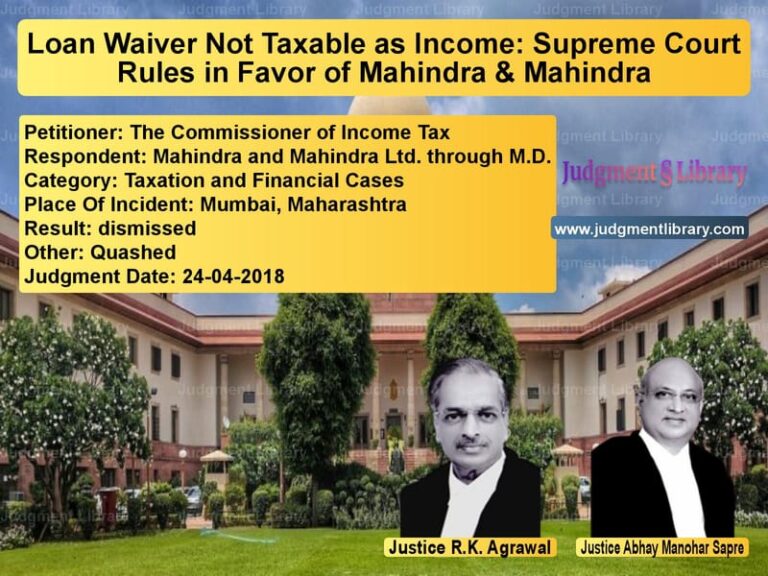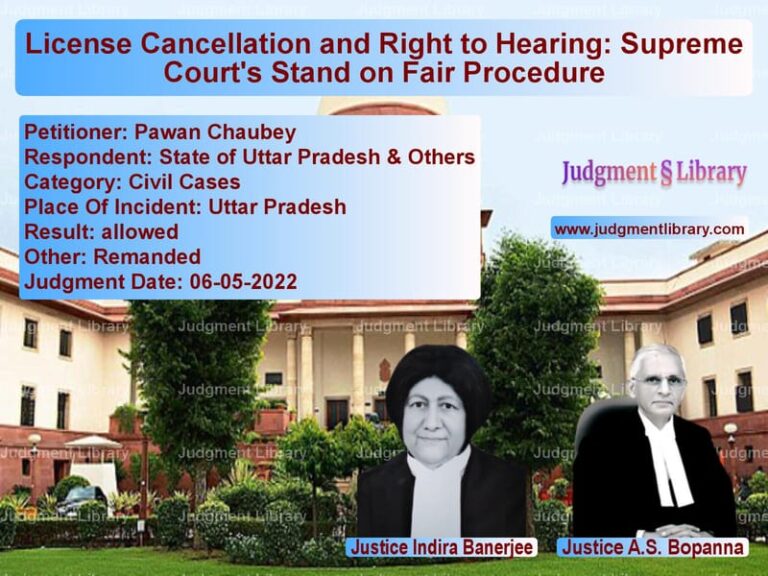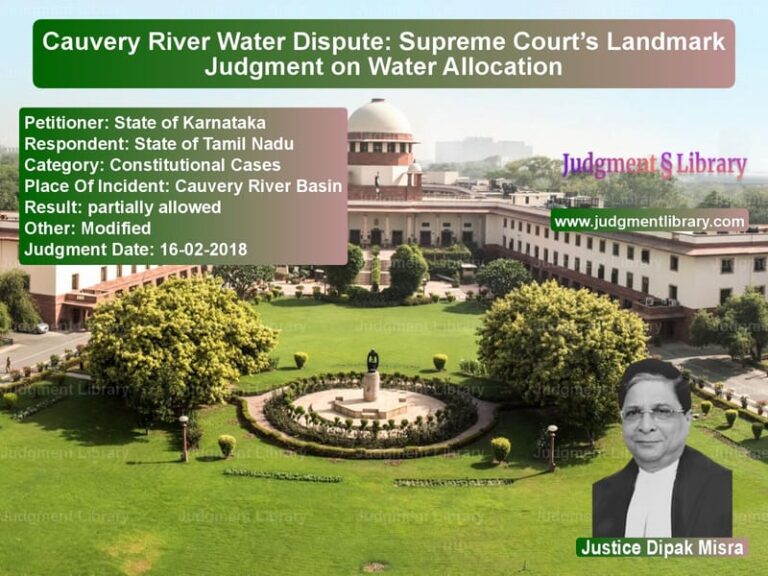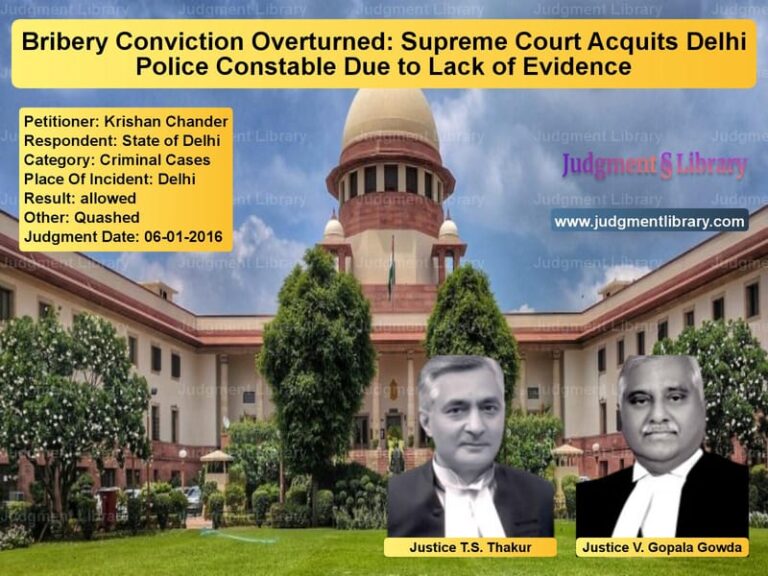Supreme Court’s Landmark Ruling on Eviction and Lease Rights in Landlord-Tenant Dispute
The dispute in Rajinder Kumar Bansal & Ors. vs. Municipal Committee & Ors. revolved around the eviction of tenants from rented land used for club activities. The Supreme Court had to determine whether such use fell within the meaning of ‘business’ under Section 2(f) of the Haryana Urban (Control of Rent and Eviction) Act, 1973. The ruling provided much-needed clarity on eviction laws, lease agreements, and the interpretation of business in the context of tenancy rights.
Background of the Case
The land in question was originally owned by Telu Ram, while Bhagwan Dass held occupancy rights under the Punjab Tenancy Act, 1887. In 1909, Bhagwan Dass executed a gift deed in favor of Louis Club to facilitate club activities on the property. However, due to legal uncertainties, he later canceled the gift deed and instead executed a lease deed on March 3, 1909, granting Louis Club perpetual occupancy rights for club-related activities. The lease stipulated that:
- The land was to be used exclusively for club activities.
- Annual rent of Rs. 10 was payable.
- Any construction on the land would be compensated at market value if the lease was terminated.
Events Leading to the Eviction Dispute
Over the years, significant changes took place:
- The club subleased a portion of the property to Ladies Tandon Club in 1936 without the landlord’s consent.
- The Municipal Committee took possession of another section of the land and installed a tubewell for public use.
- The appellants claimed that club activities had ceased and the premises were being used for government offices and public utilities.
These actions allegedly violated the lease terms, prompting the appellants to file an eviction petition on the following grounds:
- Non-payment of rent: The respondents had failed to pay rent as per the lease agreement.
- Unauthorized subletting: The club had subleased part of the property without the landlord’s permission.
- Misuse of the property: The land was no longer used for club purposes and had been abandoned.
Respondents’ Defense
The respondents, including Louis Club and the Deputy Commissioner representing the State of Haryana, raised the following defenses:
- The property was never used for business or commercial purposes.
- The land had been transferred for public benefit, which aligned with state policies.
- Their occupation was legal under state ownership, making the eviction claims invalid.
High Court’s Ruling
The High Court of Punjab & Haryana ruled in favor of the respondents, reasoning that club activities do not constitute ‘business’ under the Act. The court held that the Act applied only to rented land used for commercial purposes. Consequently, the eviction petition was dismissed.
Supreme Court’s Analysis
The Supreme Court found the High Court’s reasoning flawed and analyzed key precedents to determine the correct interpretation of ‘business’ under Section 2(f). The Court emphasized that:
- ‘Business’ need not be for profit: Activities benefiting a section of the public can be considered business.
- The lease agreement had been violated: Unauthorized subletting and non-payment of rent justified eviction.
- The change in property use: The land was now used for government offices rather than club activities.
The Court ruled that the use of land for a club and pavilion qualifies as ‘business’ under the Act. It noted:
“The expression ‘business’ in Section 2(f) need not necessarily be commercial business carried on with a profit motive. The word includes within its scope a charitable business or a dealing in the interest of the public.”
Final Judgment
The Supreme Court reversed the High Court’s ruling, stating that the eviction petition was valid and should be upheld. It directed the respondents to vacate the premises within three months and hand over possession to the appellants. The Court further clarified that:
- The land was originally leased for club activities, which had since ceased.
- Unauthorized subletting and non-payment of rent violated the lease agreement.
- The definition of ‘business’ under the Act included public-benefit activities.
Impact of the Judgment
This ruling set a significant precedent for eviction cases under rent control laws. It clarified that:
- Landlords can evict tenants who violate lease terms.
- Public-benefit activities can still be considered ‘business’ under rent laws.
- Lease agreements must be strictly adhered to, and unauthorized changes in property use can justify eviction.
The judgment reinforced the legal standing of landlords in cases where tenants misuse or abandon leased properties.
Petitioner Name: Rajinder Kumar Bansal & Ors..Respondent Name: Municipal Committee & Ors..Judgment By: Justice Hemant Gupta, Justice A.S. Bopanna.Place Of Incident: Ambala, Haryana.Judgment Date: 17-08-2021.
Don’t miss out on the full details! Download the complete judgment in PDF format below and gain valuable insights instantly!
Download Judgment: rajinder-kumar-bansa-vs-municipal-committee-supreme-court-of-india-judgment-dated-17-08-2021.pdf
Directly Download Judgment: Directly download this Judgment
See all petitions in Property Disputes
See all petitions in Landlord-Tenant Disputes
See all petitions in Contract Disputes
See all petitions in Judgment by Hemant Gupta
See all petitions in Judgment by A. S. Bopanna
See all petitions in allowed
See all petitions in supreme court of India judgments August 2021
See all petitions in 2021 judgments
See all posts in Civil Cases Category
See all allowed petitions in Civil Cases Category
See all Dismissed petitions in Civil Cases Category
See all partially allowed petitions in Civil Cases Category







